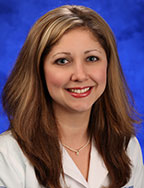Perinatal Program for Infants with Congenital Abnormalities
Approximately one in 33 babies in the U.S. is born with a birth defect. Among the most common of these are atrioventricular septal defects, spina bifida, and intestinal atresia or stenosis.1 Many major defects are detected early in pregnancy during routine ultrasound imaging. “For women with a complex, high-risk pregnancy, a multidisciplinary team is usually needed to manage the needs of the mother and baby, throughout pregnancy, delivery and in the postpartum period,” explains Jaimey M. Pauli, M.D., a maternal-fetal medicine specialist, Penn State Hershey Obstetrics and Gynecology. Dr. Pauli and Thomas Chin, M.D., chief, pediatric cardiology, are co-directors of the Penn State Hershey Perinatal Program at Penn State Hershey Medical Center and the Children’s Hospital, an active outreach program for pregnant women at high risk or patients who have newborns with birth defects or abnormalities.
“Expectant parents are often overwhelmed when they learn about these types of serious fetal abnormalities. Aside from help coping with the obvious emotional impact, they need help obtaining the complex care their baby requires. With our program, a team of specialists handles everything and provides highly coordinated care at a single center, which reduces a lot of stress and supports the parents,” adds Dr. Pauli. Through the perinatal program, Drs. Pauli and Chin assemble a team of maternal-fetal medicine specialists and pediatric specialists. This team can include pediatric cardiologists, cardiothoracic surgeons, neonatologists, neurosurgeons, pediatric surgeons, nephrologists, urologists, orthopaedic surgeons, radiologists and social workers, based on the needs of each individual infant and aimed at achieving the best possible outcomes.
The perinatal program is consulted when a patient, frequently from another institution, is diagnosed with a fetal abnormality most often at 18-20 weeks of gestation during the routine anatomical ultrasound (see overview of how one case has been handled from referral to discharge). The perinatal program coordinator, Laurie Reesman, RN, BSN, arranges appointments with the Penn State Hershey maternal-fetal medicine and pediatric specialists to provide necessary diagnostic evaluations, parent consultations, prenatal care, delivery and postnatal care.
Dr. Pauli reports that there are typically 10 new cases presented to the program each month. The perinatal program team of specialists meets on a monthly basis to discuss each case and ensure the patient has been seen by all of the necessary specialists in one location. Dr. Pauli meets weekly with the coordinators to review each patient’s plan of care.
Postpartum, mothers receive care with the maternal-fetal medicine service while the neonate becomes the focus of medical interventions. Most newborns in the program require surgery, such as complex congenital heart disease repair, closure of open neural tube defects and repair of abdominal wall defects, such as gastroschisis and omphalocele. These patients require the level of care provided in the neonatal intensive care unit (NICU) and the pediatric intensive care unit (PICU) of Penn State Hershey Children’s Hospital.
The perinatal program also arranges for non-medical care and support. The Isabel Cate Rineer Memorial Endowment in Perinatology at Penn State Hershey supports families’ physical and emotional needs during complicated pregnancies. Also, as these families want to be close to their newborns through this time, family members are provided housing free-of-charge at the Ronald McDonald House directly across the street from the Penn State Hershey campus. For newborns who require complex and continuing support after their hospital stay, families work with a social worker to help coordinate ongoing medical care in their local communities with follow-up support at Penn State Hershey Children’s Hospital. For infants with a life-threatening condition who are not expected to survive, patients and families are supported with palliative, end-of-life care provided through Penn State Hershey’s Hummingbird Program.
“We pride ourselves in offering a family-centered environment with the highest level of care available to both the pregnant mother and her infant,” comments Dr. Pauli. “Our families relate that they are extremely well-supported and informed throughout the experience. They are reassured that Penn State Hershey has the expertise to manage their high-risk pregnancy, as well as their infant’s medical and surgical needs.”
Jaimey Maureen Pauli, M.D.
Maternal-Fetal Medicine Specialist, Penn State Hershey Obstetrics and Gynecology
PHONE: 717-531-7373
E-MAIL: jpauli@hmc.psu.edu
FELLOWSHIP: Maternal-fetal medicine, Penn State Milton S. Hershey
Medical Center, Hershey, Pa.
RESIDENCY: OBGYN, Penn State Milton S. Hershey Medical Center, Hershey, Pa.
MEDICAL SCHOOL: Penn State College of Medicine, Hershey, Pa.
Connect with Jaimey Pauli, M.D. on Doximity
REFERENCE:
1. United States Centers for Disease Control: cdc.gov/ncbddd/birthdefects/data.html; accessed 8/5/2015.
Case Summary: Overview of Hypoplastic Left-Heart Syndrome Case Handled by the Penn State Hershey Perinatal Program
- Detection and referral: A 32-year-old woman is referred to the perinatal program following anatomic ultrasound at 19 weeks gestation revealing complex cardiac defects in the fetus.
- Initial evaluation: Follow-up fetal echocardiogram and additional evaluation reveal hypoplastic left-heart syndrome; mother is in good health; history of one prior healthy, full-term, vaginal birth three years ago.
- Care coordination: Perinatal program coordinator arranges parent consultations and evaluations at Penn State Hershey Medical Center on a one- or two-day schedule with the following specialists and care team members: Neonatologist, Pediatric cardiothoracic surgeon, Maternal-fetal medicine specialist, Social services, Genetics consult.
- Routine visits: Prenatal care visits with maternal-fetal medicine; serial fetal ultrasound evaluation and fetal monitoring.
- Delivery: Successful full-term vaginal delivery at 37 weeks; infant is successfully stabilized in the NICU.
- Perinatal evaluation: Infant undergoes echocardiography and is evaluated by pediatric cardiac surgery team.
- Perinatal intervention: Infant undergoes the Norwood procedure as the first step in surgical cardiac repair two days after birth; parents stay at Ronald McDonald House; infant is in PICU for 36 days.
- Discharge and ongoing support: Infant is discharged to home, with continuing supportive care from local providers and followed by Penn State Hershey pediatric cardiothoracic surgeons. The infant then undergoes a series of staged pediatric cardiac surgeries in the first several years of life.
